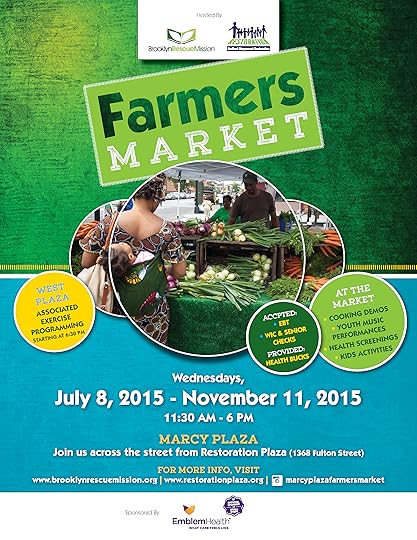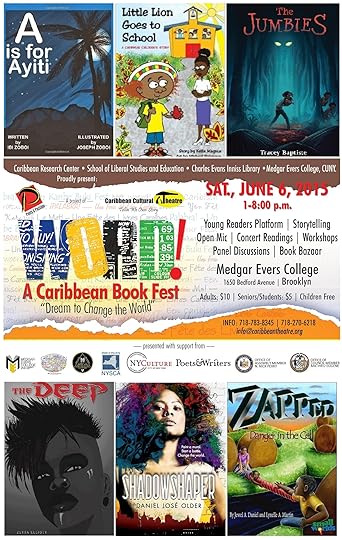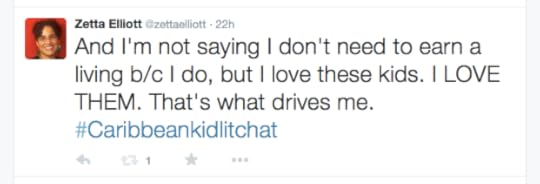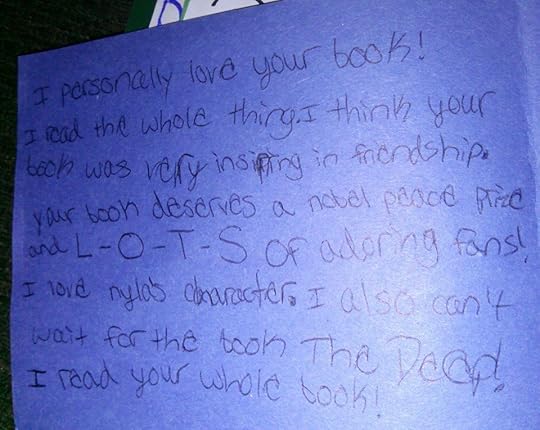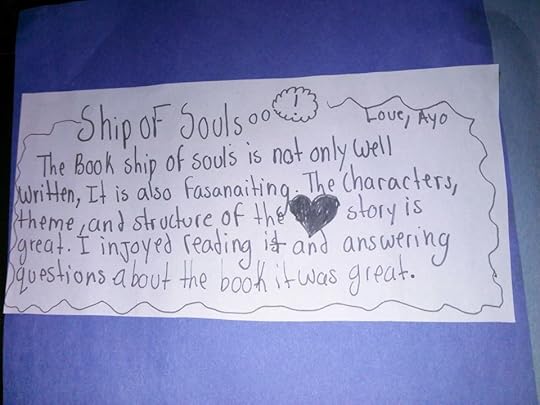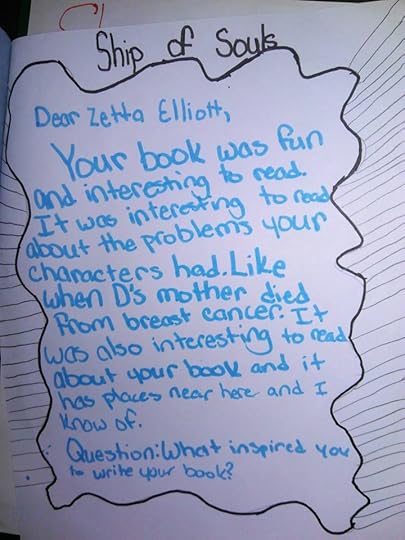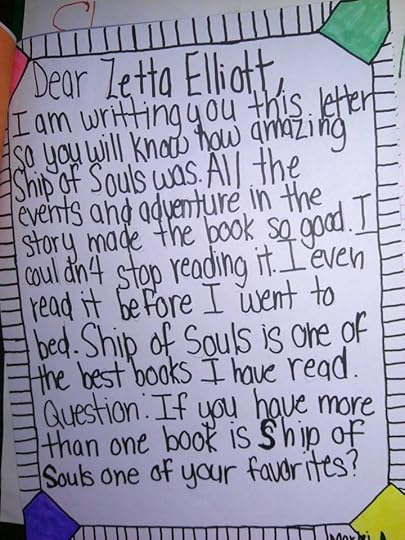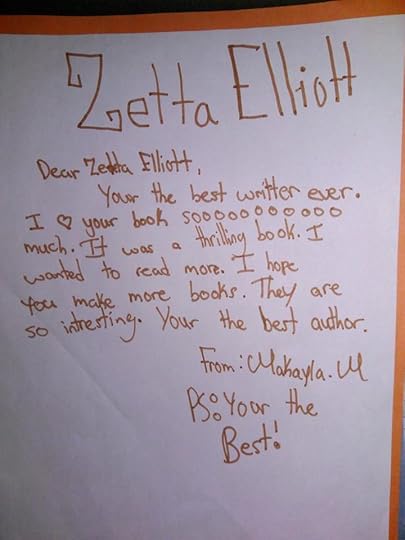Zetta Elliott's Blog, page 45
July 13, 2015
counting down the days
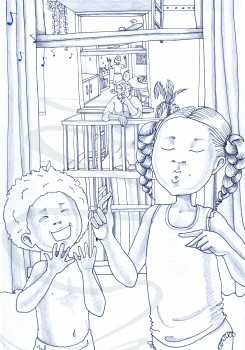 July is slipping away! I’ve got three books “in production” and so spent this morning sending feedback to my illustrators. I Love Snow! is almost finished and A Wave Came through Our Window is at the halfway mark (see the latest from Charity Russell–amazing!). I’m hoping that book will be ready by August 19, which is when I’ll be reading in the Kids Corner at the Marcy Plaza farmer’s market. I believe they’ll be giving away free books for the first ten kids, so get there early; readings are every Wednesday from 1-2pm. I’ve been reviewing my list of manuscripts and would really love to have these two illustrators work on 2 more books. But I don’t have a job this summer, so can I really afford to keep self-publishing picture books? And what about the YA novel that is about a decade overdue? Publishing old work is definitely a way to avoid creating new work. This afternoon I will be working on a discussion guide for my two City Kids books, though I also plan to make my first bundt cake. On Wednesday I’m heading up to the Bronx to learn more about Dream Yard’s collaboration with Libraries Without Borders; they’re launching the Ideas Box in a public park, which should provide local kids with hours of book-based entertainment. I’m donating a set of my books to the portable library and will let you know if they’re looking for more donations. I saw on Facebook that Jet Blue is setting up free vending machines in DC as part of their Soar with Reading program. But the books being provided to low-income communities are NOT mirrors for these Black children—the only options seem to be The Magic Treehouse series. Too often it feels like we take one step forward and two steps back…
July is slipping away! I’ve got three books “in production” and so spent this morning sending feedback to my illustrators. I Love Snow! is almost finished and A Wave Came through Our Window is at the halfway mark (see the latest from Charity Russell–amazing!). I’m hoping that book will be ready by August 19, which is when I’ll be reading in the Kids Corner at the Marcy Plaza farmer’s market. I believe they’ll be giving away free books for the first ten kids, so get there early; readings are every Wednesday from 1-2pm. I’ve been reviewing my list of manuscripts and would really love to have these two illustrators work on 2 more books. But I don’t have a job this summer, so can I really afford to keep self-publishing picture books? And what about the YA novel that is about a decade overdue? Publishing old work is definitely a way to avoid creating new work. This afternoon I will be working on a discussion guide for my two City Kids books, though I also plan to make my first bundt cake. On Wednesday I’m heading up to the Bronx to learn more about Dream Yard’s collaboration with Libraries Without Borders; they’re launching the Ideas Box in a public park, which should provide local kids with hours of book-based entertainment. I’m donating a set of my books to the portable library and will let you know if they’re looking for more donations. I saw on Facebook that Jet Blue is setting up free vending machines in DC as part of their Soar with Reading program. But the books being provided to low-income communities are NOT mirrors for these Black children—the only options seem to be The Magic Treehouse series. Too often it feels like we take one step forward and two steps back…
July 8, 2015
a good week
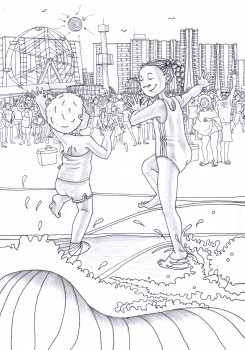 On the news recently I saw President Obama being questioned by the press about his “best week.” They meant the week when the Supreme Court ruled in favor of the Affordable Care Act and marriage equality, but Obama responded that marrying Michelle was a good week, along with the weeks when his two daughters were born. We have personal achievements and professional accomplishments; for me, a really good week combines both, though sometimes it’s hard to distinguish between the two. As a writer, I’m self-employed and spend a lot of time at home. I’m not doing school visits right now, though today I’m heading up to SVA to speak to Katie Yamasaki‘s illustration class, and on Friday I’ll Skype into Michelle Martin‘s graduate class at Simmons. Last weekend I finished the first draft of Dayshaun’s Journey (or Dayshaun’s Gift, I’m on the fence) and almost immediately found an illustrator online. Yesterday my illustrator in Hong Kong submitted all 13 illustrations for I Love Snow! and my UK illustrator, Charity Russell, is turning in fantastic pictures for A Wave Came through Our Window. On Sunday I had a chance to break bread with Ebony Thomas who’s visiting from Philadelphia. On Tuesday a group of us got together for tea and talked for hours on end. Then I walked 30 blocks with Tracey Baptiste and we got to swap ideas about organizing a movement. I know people think that introverts hate to be social, but that really isn’t true. I crave social interaction but only under certain conditions. Having a corner booth at Alice’s Teacup was perfect because all five of us fit and were close enough that we didn’t have to shout to be heard. No one rushed us out of the place, and I didn’t overindulge since they were out of banana nutella cake. Being with other writers is important because we can talk honestly about the publishing industry and certain individuals and/or trends that we consider problematic. There’s lots of laughter, a little gossip, and space to scheme. I’ve thought about leaving this support group; I’m the only self-pubber and don’t have the insider insights of the other authors. But I’m almost always the outsider—in any context—and generally prefer that position. And the ladies insist that my perspective is just as valuable, so I promised not to secede from our union anytime soon. I doubt I could replace the positive energy our monthly meetings generate, so I’m going to keep on counting my blessings and trust that this week will end just as it began.
On the news recently I saw President Obama being questioned by the press about his “best week.” They meant the week when the Supreme Court ruled in favor of the Affordable Care Act and marriage equality, but Obama responded that marrying Michelle was a good week, along with the weeks when his two daughters were born. We have personal achievements and professional accomplishments; for me, a really good week combines both, though sometimes it’s hard to distinguish between the two. As a writer, I’m self-employed and spend a lot of time at home. I’m not doing school visits right now, though today I’m heading up to SVA to speak to Katie Yamasaki‘s illustration class, and on Friday I’ll Skype into Michelle Martin‘s graduate class at Simmons. Last weekend I finished the first draft of Dayshaun’s Journey (or Dayshaun’s Gift, I’m on the fence) and almost immediately found an illustrator online. Yesterday my illustrator in Hong Kong submitted all 13 illustrations for I Love Snow! and my UK illustrator, Charity Russell, is turning in fantastic pictures for A Wave Came through Our Window. On Sunday I had a chance to break bread with Ebony Thomas who’s visiting from Philadelphia. On Tuesday a group of us got together for tea and talked for hours on end. Then I walked 30 blocks with Tracey Baptiste and we got to swap ideas about organizing a movement. I know people think that introverts hate to be social, but that really isn’t true. I crave social interaction but only under certain conditions. Having a corner booth at Alice’s Teacup was perfect because all five of us fit and were close enough that we didn’t have to shout to be heard. No one rushed us out of the place, and I didn’t overindulge since they were out of banana nutella cake. Being with other writers is important because we can talk honestly about the publishing industry and certain individuals and/or trends that we consider problematic. There’s lots of laughter, a little gossip, and space to scheme. I’ve thought about leaving this support group; I’m the only self-pubber and don’t have the insider insights of the other authors. But I’m almost always the outsider—in any context—and generally prefer that position. And the ladies insist that my perspective is just as valuable, so I promised not to secede from our union anytime soon. I doubt I could replace the positive energy our monthly meetings generate, so I’m going to keep on counting my blessings and trust that this week will end just as it began.
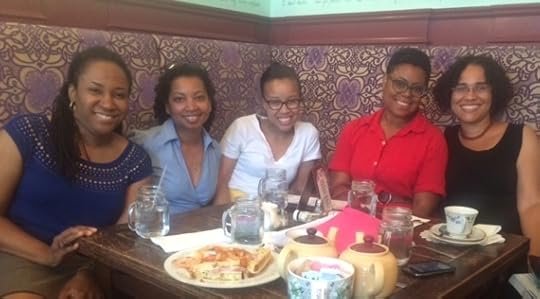
l-r: Ebony Thomas, Tracey Baptiste, Dhonielle Clayton, Ibi Zoboi, me
July 1, 2015
who you are
I’ve been asked to write another article about self-publishing and I’m not sure I have anything left to say. I’ve got a couple of ideas around white women allies versus “frenemies,” which were strengthened by this article on white women’s silence around the Charleston church murders (allegedly carried out in their name). What if the white women who dominate the children’s literature community stood up and said, “I don’t want to be an excuse for racist violence in publishing/libraries/public schools/bookstores?” Imagine how transformative that would be! But you can’t change what’s in people’s hearts. The Confederate flag can come down, people can optimistically declare #LoveWins, and Black churches will still burn in the South. Black women and girls will continue to be brutalized by police. Transgender women of color will continue to be murdered. Chloe Angyal writes,
…the distinction between women and womanhood should not let individual white women off the hook for how we benefit from and participate in racism. That we are victims of sexism does not erase our culpability in American racism. If anything, the powerlessness we feel as a result of sexism too often urges us to hold on to, and exert over others, what remaining power we have. For white women, that means the power gifted to us by the color of our skin. Few white women resisted lynching in the early 20th century. A gendered and raced pedestal isn’t always comfortable to stand on, but it comes with a lot of perks and not a small amount of power. When contemporary black feminists critique white feminists for failing to recognize, interrogate, and cede their own racial privilege, that complaint is rooted in history. The bonds of sisterhood can be strong, but too often, they have been weakened by some sisters’ willingness to continue benefitting from whiteness (or worse, their stubborn refusal to recognize that they do).
Do I want to devote more of my time and energy to critiquing white women? Not really. I’m nearing the end of this new early reader, and I’ve got two fabulous women illustrators working on picture books. A friend posted a stunning photo on Facebook this morning that was paired with a quote from Brazilian dancer Ingrid Silva: “Let your craft be an authentic representation of who you are.” My books aren’t perfect, but they accurately reflect who I am and what I believe. Working with illustrators can be challenging because I’m not entirely comfortable telling people what to do. I know what I want, but I can’t make the art myself and I want to be respectful of the illustrator’s vision for the book. But these latest collaborations have been so empowering—my illustrator in Hong Kong actually thanks me for providing guidance! And look at her work—it’s amazing. Which makes me want to do ANOTHER book with her, and so I’m sifting through over a dozen manuscripts that are growing old on my hard drive. But I also need to write. So I’m trying to find that balance. Trying to be who I am and get my work done without being distracted by racism and others’ failure to take responsibility for their actions/inaction…

“Heavenly Angelic Snow” by Fung Ming Wong from my forthcoming picture book I Love Snow!
June 27, 2015
love & marriage
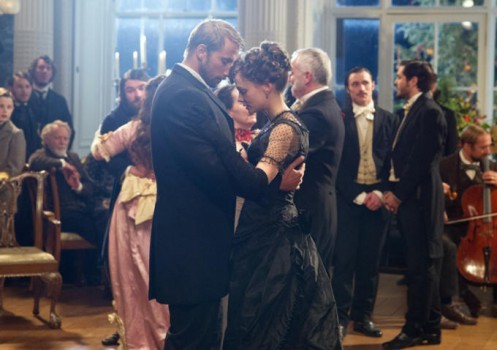 Some people ended this week on a high due to the SCOTUS ruling on marriage equality, and some remained in mourning for the 9 victims of domestic white supremacist terrorism in Charleston, SC. This morning I find myself wanting to write about love, which has been on my mind for some time now. I went to see Far from the Madding Crowd a couple of weeks ago and left the theater wishing I could name at least one love story that explored the complexity of Black love. There are so many tropes and conventions that are problematic and far-fetched—I don’t know if “love at first sight” is real, but it’s not a compelling plot device. In Far from the Madding Crowd, three men propose to a young, independently wealthy woman after meeting her once or twice. There were a couple of good lines (HIM: “I can give you a piano and a gig.” HER: “The thing is, sir, I already have a piano and a gig.”), but the film still begins with the woman
Some people ended this week on a high due to the SCOTUS ruling on marriage equality, and some remained in mourning for the 9 victims of domestic white supremacist terrorism in Charleston, SC. This morning I find myself wanting to write about love, which has been on my mind for some time now. I went to see Far from the Madding Crowd a couple of weeks ago and left the theater wishing I could name at least one love story that explored the complexity of Black love. There are so many tropes and conventions that are problematic and far-fetched—I don’t know if “love at first sight” is real, but it’s not a compelling plot device. In Far from the Madding Crowd, three men propose to a young, independently wealthy woman after meeting her once or twice. There were a couple of good lines (HIM: “I can give you a piano and a gig.” HER: “The thing is, sir, I already have a piano and a gig.”), but the film still begins with the woman 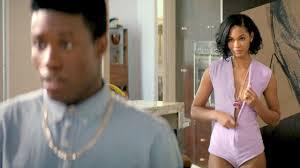 asserting, “I want to be tamed.” Overall, the men don’t fare well in that movie; one ends up dead, the other goes to prison for murder, and the “good guy” who put up with at least a year of foolishness gets the girl (though it’s unclear whether she consents to marriage). I want to see a movie that shows how love evolves over time, and I’d really like to see something that shows the inner workings of a (Black) man’s mind. Maybe that’s why I was so unimpressed with Dope when I saw it last week. The representation of the 3 women in the movie—all light-skinned—is appalling and the nerds don’t really seem like outliers. There’s some bullying, but then the conventions of masculinity kick in and they’re suddenly selling drugs, toting guns, and having hot chicks throw themselves at their feet. Sigh. The premise did seem original but all radical possibilities around gender vanished as the movie progressed. I found myself checking the time and posting my disappointment on Facebook. Wealthy Black men (Sean Combs, Pharrell Williams, Forest Whittaker) funded this film and that really depresses me because it means that THIS is how they prefer to see Black women. I think they should change the movie’s title to Done or Nope…
asserting, “I want to be tamed.” Overall, the men don’t fare well in that movie; one ends up dead, the other goes to prison for murder, and the “good guy” who put up with at least a year of foolishness gets the girl (though it’s unclear whether she consents to marriage). I want to see a movie that shows how love evolves over time, and I’d really like to see something that shows the inner workings of a (Black) man’s mind. Maybe that’s why I was so unimpressed with Dope when I saw it last week. The representation of the 3 women in the movie—all light-skinned—is appalling and the nerds don’t really seem like outliers. There’s some bullying, but then the conventions of masculinity kick in and they’re suddenly selling drugs, toting guns, and having hot chicks throw themselves at their feet. Sigh. The premise did seem original but all radical possibilities around gender vanished as the movie progressed. I found myself checking the time and posting my disappointment on Facebook. Wealthy Black men (Sean Combs, Pharrell Williams, Forest Whittaker) funded this film and that really depresses me because it means that THIS is how they prefer to see Black women. I think they should change the movie’s title to Done or Nope…
I can be fairly sentimental but I’m not a romantic. And I don’t want to rain on anyone’s parade, but I’m troubled by the hashtag #LoveWins. The right to marry really isn’t about love, it’s about privileging a certain expression of love, and those of us who don’t wed are certainly not “condemned to live in loneliness” as Justice Kennedy opined. I’m glad that people who want to marry can do so legally in the US, but as a single, child-free woman I will never receive the rewards reserved for married couples. This past week many of us celebrated the SCOTUS ruling upholding Obamacare—and that’s something from which I DO benefit—but it saddens me that we’ve all but forgotten that the single-payer system was the best, truly radical option (except for presidential hopeful Bernie Sanders). In this insightful article, “Marriage Will Never Set Us Free,” two scholars break down the ways in which the marriage equality movement deflects attention and resources away from the truly radical goals of social justice movements:
Same sex marriage advocacy has been harmful just like other political strategies that seek inclusion in a violent state apparatus–such as the fight for gay and lesbian military service. Inclusion strategies like these valorize the things they seek inclusion in. Same-sex marriage advocacy has lined up with right wing family values rhetoric and policy to undo the work of our movements to gradually dismantle marriage and separate access to key necessities from marital status. It has aligned with conservative pro-marriage ideas about romance, children, families and care that support the attacks on social welfare programs and most severely harm low-income mothers of color. It has rescued marriage from Left critique and made straight and gay people on the Left forget what our movements have taught us about state regulation of families and gender. (my emphasis)
And then, of course, there’s the way in which the marriage equality ruling eclipsed the funeral of Rev. Clementa Pinckney. Kimberle Crenshaw’s Facebook post summed it up:
Steeling myself against rage today… the funeral of Senator Pinckney, delayed, now framed as “coming on the heels” of the Supreme Court’s landmark decision on same sex marriage. Today’s mind numbing contradiction is being framed as a window into the diversity of the President’s responsibilities, not about the deep, profound, disturbing reality that Black people still live in terror in this country. Nine dead people–killed while worshipping–are now afterthoughts, to be squeezed into the celebration of American Democracy. So now…Black people can marry whomever they please, but we can’t vote, worship, represent our people, swim, shop, or walk the streets without fear of being discriminated against or even killed. So on this day of sorrow and celebration, this is what democracy looks like.
Love, marriage, loss…

The grieving wife and daughters of slain State Senator Rev. Clementa Pinckney.
June 19, 2015
a pretty package
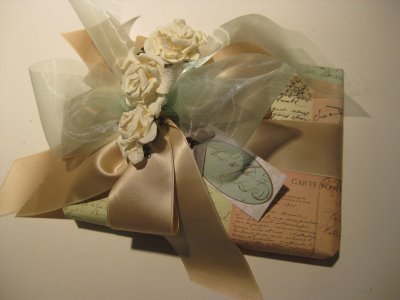 Billie Holiday didn’t write “Strange Fruit.” It ultimately became her signature song, but it was written by
a white man
. Does that matter? Most would probably say “no.” When a Black friend told me she was going to write for a book packager, I wasn’t surprised. She’s an emerging author and working with a book packager is a great way to earn a little money while writing with a “coach.” But then another friend told me a story about a Black woman who wrote books for a packager that fell short of their expectations; the packager hired a white woman to rewrite the books, and yet the Black woman’s name remains on the published books. I started to wonder how often this happens, and with the Dolezal scandal in the news recently, I worry that book packaging might become just another way to “fake” diversity in publishing. I thought about a group of white editors sitting in a room, coming up with ideas for books about people of color. Could a book developed by a white packager go on to win the Coretta Scott King Award? To help me sort through these issues I reached out to two women of color packagers:
Dhonielle Clayton
of
Cake Literary
and
Rhoda Belleza
of
Paper Lantern Lit
. They graciously agreed to share their insights as insiders who know all too well just how hard it can be for writers of color to break into the publishing industry.
Billie Holiday didn’t write “Strange Fruit.” It ultimately became her signature song, but it was written by
a white man
. Does that matter? Most would probably say “no.” When a Black friend told me she was going to write for a book packager, I wasn’t surprised. She’s an emerging author and working with a book packager is a great way to earn a little money while writing with a “coach.” But then another friend told me a story about a Black woman who wrote books for a packager that fell short of their expectations; the packager hired a white woman to rewrite the books, and yet the Black woman’s name remains on the published books. I started to wonder how often this happens, and with the Dolezal scandal in the news recently, I worry that book packaging might become just another way to “fake” diversity in publishing. I thought about a group of white editors sitting in a room, coming up with ideas for books about people of color. Could a book developed by a white packager go on to win the Coretta Scott King Award? To help me sort through these issues I reached out to two women of color packagers:
Dhonielle Clayton
of
Cake Literary
and
Rhoda Belleza
of
Paper Lantern Lit
. They graciously agreed to share their insights as insiders who know all too well just how hard it can be for writers of color to break into the publishing industry.***
1. I have a theory about community-based publishing being “organic” as opposed to traditional publishing, which forces stories by people of color through a (white) filter/editorial process. How do *you* think about books produced through the packaging process? Dhonielle, CAKE Literary’s motto is “stories from scratch”–what does this mean in a packaging context? Rhoda, does your role as “architect” allow you to build a “dream house,” or does it create a brain/body split where writers provide physical labor whereas editors provide intellectual/imaginative direction? I’m interested in the power dynamics.
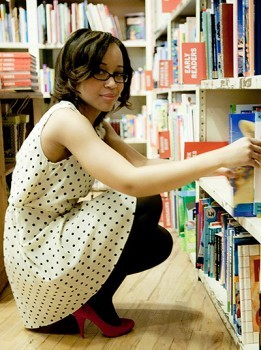 DC: CAKE’s motto “stories from scratch” relates to our belief that writing a book is like making a cake, but it also speaks to how we approach building stories. We carefully think about the elements, or ingredients, in order to create the most interesting, impactful — and flavorful — end result; a deliciously diverse read. Sona and I both suffer from colonized imaginations, or a cultural Stockholm Syndrome where we, unfortunately, have whiteness living in our imaginations, and we have to actively work to eradicate this reality. As women from marginalized communities, we were plagued with misrepresentation, erasure, and lack of representation in the books we read as children and teens. We wanted to develop decidedly diverse stories and provide collaborative opportunities with writers-of-color and other marginalized writers. We live our lives put through a white filter, so the editorial process, being part of that, can sometimes feel that way. The way publishing is structured, the way books are presented, the way stories are told, all come from a white, Anglo-Saxon, cis-gendered, able-bodied, heteronormative, and Christian context and tradition. We’ve been trained to expect stories to take a specific form and shape, and can often be shocked and uncomfortable when they don’t (cultural Stockholm Syndrome!). But Sona and I actively think about these issues as we create new properties, and have conversations about it to make sure we’re making the right development choices.
DC: CAKE’s motto “stories from scratch” relates to our belief that writing a book is like making a cake, but it also speaks to how we approach building stories. We carefully think about the elements, or ingredients, in order to create the most interesting, impactful — and flavorful — end result; a deliciously diverse read. Sona and I both suffer from colonized imaginations, or a cultural Stockholm Syndrome where we, unfortunately, have whiteness living in our imaginations, and we have to actively work to eradicate this reality. As women from marginalized communities, we were plagued with misrepresentation, erasure, and lack of representation in the books we read as children and teens. We wanted to develop decidedly diverse stories and provide collaborative opportunities with writers-of-color and other marginalized writers. We live our lives put through a white filter, so the editorial process, being part of that, can sometimes feel that way. The way publishing is structured, the way books are presented, the way stories are told, all come from a white, Anglo-Saxon, cis-gendered, able-bodied, heteronormative, and Christian context and tradition. We’ve been trained to expect stories to take a specific form and shape, and can often be shocked and uncomfortable when they don’t (cultural Stockholm Syndrome!). But Sona and I actively think about these issues as we create new properties, and have conversations about it to make sure we’re making the right development choices.RB: You’d said in your post that packagers have radical potential, and I’m so thankful for the acknowledgement. As a packager, Paper Lantern Lit provides an overall concept, character sketches, and a loosely plotted outline for the writer to work off of. As an architect, I find this less of an exercise of building my “dream house” because that has sentimental connotations; I love the projects I work on but I don’t romanticize my part in them. I strive to create sturdy structures that are made beautiful and given character by our authors.
I definitely don’t see the power dynamic as a brain/body split; authors have to bring an immense amount of intellect and imagination when they write for hire. As a packager, we can plot the entire thing to great detail, but we don’t—because we know that in the moment, when the author commits a scene to page, whatever any of us previously imagined will inevitably change. Writing off of any outline, even your own, requires huuuge feats of imagination and problem solving. In terms of a power dynamic, I see it is greatly collaborative. I’m bouncing ideas around with my authors constantly.
2. Foods that contain GMOs are labeled in many states so that consumers know just what they’re getting. Should books produced by packagers be labeled so that readers–and especially reviewers, award committee members–know that the author isn’t (solely) responsible for the content?
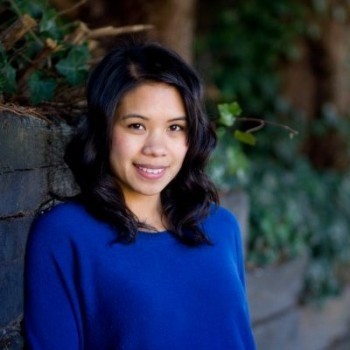 RB: I don’t see the necessity but I’m not opposed to it, either. For any curious readers, this kind of information isn’t difficult to find. I know both Paper Lantern and Cake proudly display these books on their sites, and authors acknowledge us in their back content.
RB: I don’t see the necessity but I’m not opposed to it, either. For any curious readers, this kind of information isn’t difficult to find. I know both Paper Lantern and Cake proudly display these books on their sites, and authors acknowledge us in their back content.
Apart from self-publishing, I wonder if any writer is solely responsible for the content? The editor at a publishing house will have suggestions that run the gambit. Maybe you’ll be asked to adjust a scene or maybe you’ll be tasked to make the character more heartfelt throughout their journey. Same thing with packaging editors, I believe, though we’re just part of the process earlier. Either way, an editor is an outside reader you work with to polish your vision—to clarify ideas, move the plot from A to B efficiently, rearrange blocks of text so that the flow of it is logical. Like I said, not very romantic….
Packaged or not, the author does some seriously heavy lifting—and of course, you can take or leave those suggestions, but I really do believe that collaboration shapes the book in remarkable ways. And suffice to say, it only works when the author and the editor trust one another!
DC: Usually this information is found on the copyright page. It shows whether the copyright is shared between the packager and the author, or solely belongs to the packager. Readers, award committee members, and reviewers can discover this information rather easily. Packaging used to be feel more secretive and insider-y — which is a large problem — but now I think it’s becoming more of an open secret. I like that it feels more open because writers, especially writers from marginalized communities, might be able to explore these economic opportunities, and have access to work-for-hire projects to supplement their writing careers like other writers have done for decades.
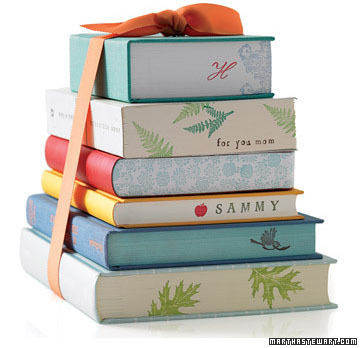 3. For writers of color who are largely excluded from the publishing industry and/or have little chance of working with an editor of color, what are the advantages of writing for a book packager? Does it make a difference when the “scripts” are developed by people of color instead of whites? Why not run a literary agency and help writers to develop their own ideas rather than developing the narratives yourselves?
3. For writers of color who are largely excluded from the publishing industry and/or have little chance of working with an editor of color, what are the advantages of writing for a book packager? Does it make a difference when the “scripts” are developed by people of color instead of whites? Why not run a literary agency and help writers to develop their own ideas rather than developing the narratives yourselves?
DC: The best part of the packaging process — and the biggest advantage — is learning the art of collaboration. If you work with a great packager, you will feel like you’re in the story trenches with someone else, and that you aren’t alone. Writing can be such a solitary path, and working with a packager can help make this process feel a little less lonely, as you navigate it. At CAKE, Sona and I build the batter, but the writer is the one that comes in with the spice, adding their own uniqueness to the project. You will also get a crash course in the traditional publishing process, and access to the contacts of a company.
The reason Sona and I launched a packaging company was because we were both a well-spring of ideas. We knew that we would never be able to write — or do justice — to all the ideas we cooked up. After our MFA program, we also felt like the publishing world was a “good ol’ girls/boys club” and we dealt with many alienating experiences as women of color trying to exist in this space. We wanted to reach back and help other writers who also wanted to take the path of traditional publication, but struggled with their own manuscripts. We thought this could be a way to help people economically stay afloat as well as work on their craft, create something new, and return to their own work renewed. We didn’t start a literary agency because our skill set isn’t suited to negotiating (and wading through) dense contracts.
RB: The best kind of book packagers serve as literary incubators. Writers get to see the inner workings of what it takes to craft a proposal, go on submission, and sell their book. They get their foot in the door, and several authors who have completed a book series with us go on to find their own agents and write their own series. Between our five employees at Paper Lantern Lit, we have 25+ years of traditional publishing experience—and for a writer or color who wants to go that route, you can leverage our experience and contacts to your advantage.
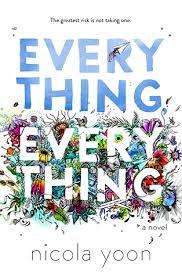 And since we know many editors and publishers, we are are able to more quickly distinguish where there might be a hole or demand or need in the market, and it’s quicker for us to develop than to sift through thousands of potential applicants. We’re creating our own destiny, rather than waiting for something to fall into our laps. For the right writer/project, PLL would work with an editor to flesh out their idea—but those circumstances are very unique.
And since we know many editors and publishers, we are are able to more quickly distinguish where there might be a hole or demand or need in the market, and it’s quicker for us to develop than to sift through thousands of potential applicants. We’re creating our own destiny, rather than waiting for something to fall into our laps. For the right writer/project, PLL would work with an editor to flesh out their idea—but those circumstances are very unique.
The literary agency is a different thing all together; the assistance you described sounds like what literary agents do now a days (or many of them do). For me, I like my capacity as an editor and would rather leave selling to other people.
4. If a packaged book won an award, to whom should it go? Writer or packager?
RB: That would be the author!
DC: I think the award should be shared, if this is possible. The idea originated with the packager, but the execution was a combination of the writer’s unique skills and the packager’s editorial direction. Or packaged books can be eliminated from award consideration. I’m not sure if one has won an award before. I would need to research that.
***
Dhonielle Clayton spent most of her childhood under her grandmother’s table with a stack of books. She hails from the Washington, D.C. suburbs on the Maryland side. She earned an MA in Children’s Literature from Hollins University and an MFA in Writing for Children at the New School. She taught secondary school for several years. Now, she is a librarian at Harlem Village Academies and co-founder of CAKE Literary, a creative kitchen whipping up decadent — and decidedly diverse — literary confections for middle grade, young adult, and women’s fiction readers. Her debut novel TINY PRETTY THINGS with Sona Charaipotra is out now, and her YA fantasy series THE BELLES is coming soon from Disney/Hyperion, and she is represented by Victoria Marini at ICM/Gelfman Schnieder. Twitter: @brownbookworm
Rhoda Belleza received her BA in English and Communications from the University of California, Santa Barbara. Post-graduation, she wandered up and down the West Coast, stopping in almost every city along the way. Fortunately, none of them fit quite right. She finally found a home in Brooklyn – where she lives, breathes, and eats fiction. She’s the editor of Cornered: 14 Stories of Bullying and Defiance, and her work has appeared on the rumpus.net. Before becoming an associate editor at Paper Lantern Lit, she was a copywriter, barista, shuttle driver, and writing instructor. She loves to feel the seasons change and is currently in a co-dependent relationship with her bicycle. Twitter: @rhodabee
June 10, 2015
disappearing into the system
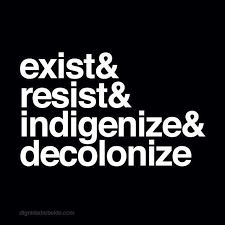 I saw this meme on Facebook over a year ago, and its mandate has stayed in my mind. Ever since I was in graduate school, I’ve been thinking about the (mis)treatment of American Indians and those nations’ responses to their attempted extermination.* In some ways that part of American history felt like a cautionary tale and I would whisper to myself, “We’re next.” African Americans and American Indians have distinct histories and experiences with the dominant culture, but there is some overlap and this meme resonates with me as a Black feminist writer who continues to grapple with the legacy of colonization. I’ve been thinking lately of my father’s childhood in Nevis, which was then still a British colony. I think of him feeling alone and unhappy as his well-meaning Afro-Caribbean grandmother forced him to stay indoors and read Alice in Wonderland while telling him each night to pinch his nose so he could look more European and less African. My father grew up hating literature, which made it difficult for him to relate to a bookish daughter who aspired to become a writer. As an adult I witnessed his ongoing dissatisfaction with his hair texture—and mine—and I think it’s likely that he married a white woman in order to distance himself from his own Blackness. My father wanted his children to have the advantages he lacked, yet when he looked at me he
I saw this meme on Facebook over a year ago, and its mandate has stayed in my mind. Ever since I was in graduate school, I’ve been thinking about the (mis)treatment of American Indians and those nations’ responses to their attempted extermination.* In some ways that part of American history felt like a cautionary tale and I would whisper to myself, “We’re next.” African Americans and American Indians have distinct histories and experiences with the dominant culture, but there is some overlap and this meme resonates with me as a Black feminist writer who continues to grapple with the legacy of colonization. I’ve been thinking lately of my father’s childhood in Nevis, which was then still a British colony. I think of him feeling alone and unhappy as his well-meaning Afro-Caribbean grandmother forced him to stay indoors and read Alice in Wonderland while telling him each night to pinch his nose so he could look more European and less African. My father grew up hating literature, which made it difficult for him to relate to a bookish daughter who aspired to become a writer. As an adult I witnessed his ongoing dissatisfaction with his hair texture—and mine—and I think it’s likely that he married a white woman in order to distance himself from his own Blackness. My father wanted his children to have the advantages he lacked, yet when he looked at me he 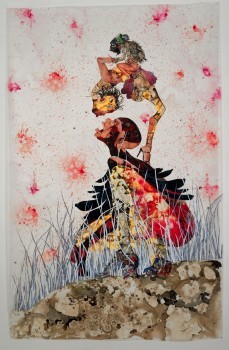 couldn’t understand where I came from; I was too different, too hard to control, and not invested in the things that mattered to him. I can say NOW that I’m grateful for all the battles I had to fight at home, because they pushed me out into the world where I found alternate ways of building and/or experiencing family. I think my ability to resist my “home training” truly mystified my father because even though he grew an Afro and had a brief Black Power moment around 1980, he was ultimately unable to sustain his own resistance and so was haunted by the voices that told him he wasn’t “good enough.”
couldn’t understand where I came from; I was too different, too hard to control, and not invested in the things that mattered to him. I can say NOW that I’m grateful for all the battles I had to fight at home, because they pushed me out into the world where I found alternate ways of building and/or experiencing family. I think my ability to resist my “home training” truly mystified my father because even though he grew an Afro and had a brief Black Power moment around 1980, he was ultimately unable to sustain his own resistance and so was haunted by the voices that told him he wasn’t “good enough.”
I still struggle to decolonize my imagination; I readily consumed imperialist British literature in my youth, and therefore internalized messages that erased, distorted, or degraded my Black female self-image. Reading literature of the African diaspora did a LOT to restore some of what was lost, but my storytelling voice still reveals the lasting influence of those British novels I loved so much as a child. In a conversation with Nicole Moore and Toshi Reagon over at the Hotness, Wangechi Mutu describes (what sounds to me like) the fulfillment of the mandate to “exist & resist & indigenize & decolonize:”
Black people are going to have to heal and empower and build their own spaces themselves. It’s not going to come from the outside. We are never going to get apologies for colonization. We’re never going to get the reparations we deserve. We’re never going to get an explanation for the cruelty that was dealt upon us for all of those years. So we have to decide to self-heal, which is very difficult. But you have to say, “This happened and I’m still here. I am a witness to this legacy of this madness. But I’m alive.” So I’m going to make testament to my livelihood by doing something beautiful and creative and crazy and bold and sexy and interesting and magnificent because that’s what they didn’t want us to do. We were supposed to disappear somehow into the system.
Mutu , who was born in Kenya, explains how her journey as a transnational artist made her empathetic to the journey of many LGBT Africans: “I had to leave my family, my country and my continent and say that I’m an artist. There was no support. No explanation for how I could make it.” I found a writing community and Black feminist role models by leaving my family and my country behind, and though I’m based in the US, I identify with other Commonwealth writers who see the production of children’s literature as a necessary postcolonial project. This came up during the #Caribbeankidlitchat hosted by Summer Edward , and she is contributing to a MOOC (massive open online course) that is specially designed for Commonwealth writers interested in writing for children . Children everywhere need books that are mirrors, but what special needs might children have in formerly colonized communities? We need diverse books that serve as mirrors AND counternarratives if we’re going to undo (or at least address) the damage caused by the imposition of dominant culture values that devalue kids of color.
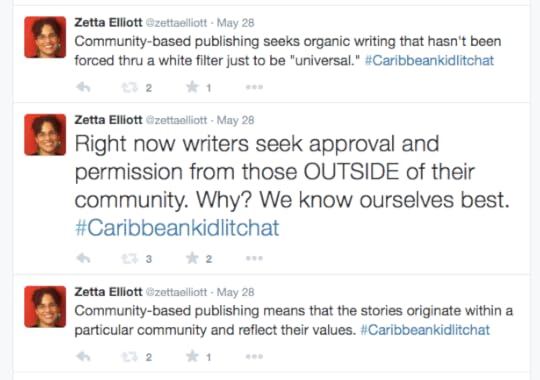
For my next post, I’ll be interviewing Dhonielle Clayton of Cake Literary and Rhoda Belleza of Paper Lantern Lit about the radical potential of book packagers. In some ways, packagers seem antithetical to my vision of “organic,” community-based publishing, but I also believe in using multiple strategies to get more inclusive books into kids’ hands. Do book packagers offer a way to resist the system, or are writers of color at risk of “disappearing into the system?” I’m grateful that these two women of color are willing to share this insider insights—stay tuned!
*If you know already know about Debbie Reese’s important blog, American Indians in Children’s Literature, go there NOW.
June 5, 2015
join us tomorrow!
June 3, 2015
not the end
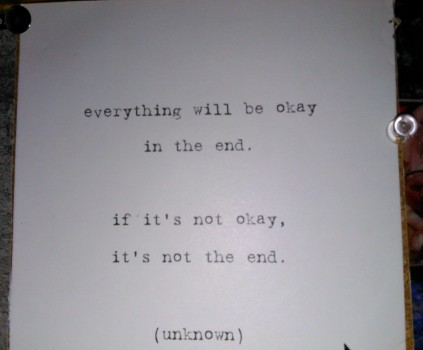 I’m not good with endings. I try to avoid funerals and don’t do long, messy goodbyes at the airport. It’s easier to make a clean break and just walk away. Of course, life is rarely that simple. This time last year I was trying to cut the cord at my academic job; I stopped checking my work email and made sure my students had no grounds for challenging their grades. I kept in touch with my colleagues but I didn’t go back to campus once my office was cleared out. I wanted to fully embrace my new writer’s life and eventually stopped checking the online academic job boards. Wrapping up my residency at Weeksville is taking longer than I thought. On Monday I turned in a draft of the picture book they commissioned me to write, and I’m halfway through a longer chapter book that sends a boy named DeShawn back in time. I’m not sure what lesson I want him to learn while he’s gone, but I’m incorporating messages about urban gardens and Hurricane Sandy. It feels good to just be putting words on the page, letting the story go wherever it wants. I’ll have to have more focus when I switch over to the novel; it’s 90% done, and so I’m not going to spend a lot of time revising—I just want to fill in the blanks and move on.
I’m not good with endings. I try to avoid funerals and don’t do long, messy goodbyes at the airport. It’s easier to make a clean break and just walk away. Of course, life is rarely that simple. This time last year I was trying to cut the cord at my academic job; I stopped checking my work email and made sure my students had no grounds for challenging their grades. I kept in touch with my colleagues but I didn’t go back to campus once my office was cleared out. I wanted to fully embrace my new writer’s life and eventually stopped checking the online academic job boards. Wrapping up my residency at Weeksville is taking longer than I thought. On Monday I turned in a draft of the picture book they commissioned me to write, and I’m halfway through a longer chapter book that sends a boy named DeShawn back in time. I’m not sure what lesson I want him to learn while he’s gone, but I’m incorporating messages about urban gardens and Hurricane Sandy. It feels good to just be putting words on the page, letting the story go wherever it wants. I’ll have to have more focus when I switch over to the novel; it’s 90% done, and so I’m not going to spend a lot of time revising—I just want to fill in the blanks and move on.
I rarely write about my siblings because they don’t speak to me and after years of chasing after them, I finally gave up and moved on. This week I got an email from my younger sister letting me know she has moved to Brooklyn. I’m not sure what to do with that information. If anyone else in my life stopped speaking to me for six years and then let me know they were in town, I’d probably just hit delete. Family for me is all about failed relationships. I’m blessed to have a loving, supportive, extended family, but my siblings are just a disaster. And I don’t know how to move forward. The Scorpio in me doesn’t want to forget the pain of rejection without reason, and I don’t believe the rules should apply to everyone in my life except the folks who share my DNA. It’s easier when my siblings are on the other side of the border, but apparently the universe isn’t ready to let me off the hook. No clean break, no real resolution. Just another dose of doubt and stress. What’s that line from The Sound of Music? “I always try to keep faith in my doubts.” I don’t like it when things drag on and on, but I’m going to try to keep an open mind. The universe clearly wants me to learn something about living in the past instead of confronting the present and shaping the future. It’s easier to do in fiction!
May 29, 2015
high
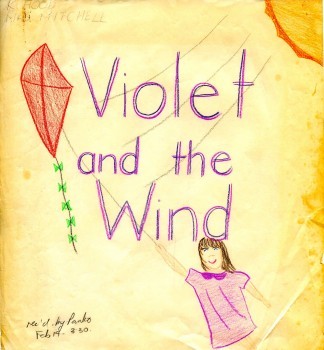 I was too high to write last night so I didn’t blog, but this morning I’m worried I won’t remember every detail of yesterday’s amazing school visit. In case you don’t know, I don’t drink or smoke; I was high as a kite yesterday because I absorbed the energy (love) of the kids and teachers I met at PS 282, and then I came home and participated in a Twitter chat about self-publishing in the evening. The night before I spent hours developing a new Powerpoint presentation for my audience of 200 3rd and 4th graders. I met those same kids the month before at their school’s readathon, and so I needed a new presentation on the books they haven’t yet read. Last time they were holding copies of The Boy in the Bubble and The Magic Mirror, so this time around I talked about the importance of “mirror books” and my motivation for writing books that center kids of color. I shared a few illustrations from my very first picture
I was too high to write last night so I didn’t blog, but this morning I’m worried I won’t remember every detail of yesterday’s amazing school visit. In case you don’t know, I don’t drink or smoke; I was high as a kite yesterday because I absorbed the energy (love) of the kids and teachers I met at PS 282, and then I came home and participated in a Twitter chat about self-publishing in the evening. The night before I spent hours developing a new Powerpoint presentation for my audience of 200 3rd and 4th graders. I met those same kids the month before at their school’s readathon, and so I needed a new presentation on the books they haven’t yet read. Last time they were holding copies of The Boy in the Bubble and The Magic Mirror, so this time around I talked about the importance of “mirror books” and my motivation for writing books that center kids of color. I shared a few illustrations from my very first picture 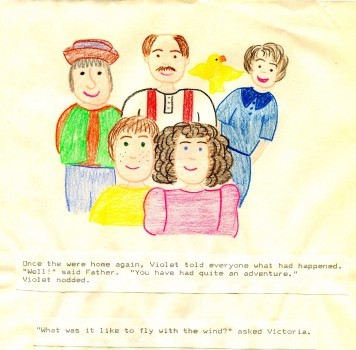 book, which I made for a creative writing class during my senior year of high school (1990). I ultimately dropped that class (I was failing!) but I kept the little book and when I asked the kids what they noticed about my pictures, a Black boy in the front row said, “That book isn’t a mirror for you.” Exactly. But this is what happens when, as a child of color, you consume nothing but books about white children. Every year I meet Black children who show me books they’ve made with blond-haired, blue-eyed families…it’s heartbreaking, but preventable (see Mia Birdsong’s rules for buying her daughter books). The students at this school are overwhelmingly Black and Latino, and their teachers are committed to 1) developing a love of reading in the kids, 2) developing book-buying habits by taking annual trips to the local Barnes & Noble, and 3) providing students with “mirror books” that counter the daily erasure kids of color face in this society. One boy
book, which I made for a creative writing class during my senior year of high school (1990). I ultimately dropped that class (I was failing!) but I kept the little book and when I asked the kids what they noticed about my pictures, a Black boy in the front row said, “That book isn’t a mirror for you.” Exactly. But this is what happens when, as a child of color, you consume nothing but books about white children. Every year I meet Black children who show me books they’ve made with blond-haired, blue-eyed families…it’s heartbreaking, but preventable (see Mia Birdsong’s rules for buying her daughter books). The students at this school are overwhelmingly Black and Latino, and their teachers are committed to 1) developing a love of reading in the kids, 2) developing book-buying habits by taking annual trips to the local Barnes & Noble, and 3) providing students with “mirror books” that counter the daily erasure kids of color face in this society. One boy  came up to me and tugged at my arm saying, “Remember me? Remember me? I was in the 3rd grade presentation last time.” I did remember him; he’s in the 5th grade but for whatever reason had been removed from his class during my last visit. He wanted me to know how much he loved reading Ship of Souls, and how he kept his face in the book and wouldn’t put it down—even when a friend invited him to go out. Another girl stood up during my presentation and said she and her friends had worked out some theories about D’s missing father. I had a vague idea about D’s father but told the kids I was pretty sure I’d have to write a fourth book in order to explain everything. “What is D’s special skill?” I asked them. “He’s good at math!” “Right. So if he inherited that from his father, what job do you think his dad might have?” “A mathematician!” And then one girl cried out, “A spy!” “Ah, that’s it!” I told her. And so now the fourth book is set: D’s parents were both spies but his mother left the CIA when she got pregnant. D’s father couldn’t—or wouldn’t—extricate himself from that shadowy life, so his mother made his dad promise to leave them alone. Kids don’t know just how much it helps me to talk about my
came up to me and tugged at my arm saying, “Remember me? Remember me? I was in the 3rd grade presentation last time.” I did remember him; he’s in the 5th grade but for whatever reason had been removed from his class during my last visit. He wanted me to know how much he loved reading Ship of Souls, and how he kept his face in the book and wouldn’t put it down—even when a friend invited him to go out. Another girl stood up during my presentation and said she and her friends had worked out some theories about D’s missing father. I had a vague idea about D’s father but told the kids I was pretty sure I’d have to write a fourth book in order to explain everything. “What is D’s special skill?” I asked them. “He’s good at math!” “Right. So if he inherited that from his father, what job do you think his dad might have?” “A mathematician!” And then one girl cried out, “A spy!” “Ah, that’s it!” I told her. And so now the fourth book is set: D’s parents were both spies but his mother left the CIA when she got pregnant. D’s father couldn’t—or wouldn’t—extricate himself from that shadowy life, so his mother made his dad promise to leave them alone. Kids don’t know just how much it helps me to talk about my 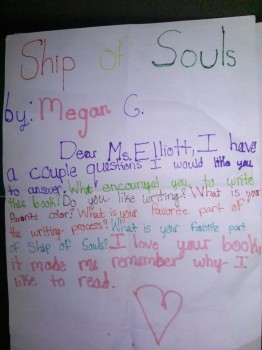 story ideas with them; it makes a difference when you look into the faces of your readers and see how invested they are in the characters, how eager they are for the story to continue. Later, after lunch, I was heading back to the auditorium when a boy stopped me and asked about the titles of my “freaks & geeks” books. “Well, Book #3 is called The Return, and I haven’t come up with a title for Book #4. Do you have any ideas?” We agreed it should have something to do with math or spies. “What about The Code?” I asked him and he broke into the widest grin. “That’s it–that’s what you should call your book!” The kids had made art for me and they wrote down some really fantastic questions. One girl asked me if I had a particular interest in African American history since I included it in Ship of Souls and The Magic Mirror. Another girl asked whether I felt parts of Ship of Souls were appropriate for kids, which let me talk about how I changed the ending at a friend’s urging and how I felt urban kids were mature enough to handle topics that might worry some adults. Ms. Fraser, my fabulous host, admitted that she had the same concern when she first read the novel, but then shared it with her 5th graders and they LOVED it. And I love teachers who take their cues from the kids! My morning presentation focused on Bird and Ship of Souls, but the afternoon presentation introduced the 3rd and 4th graders to my Rosetta Press titles. I gave a version of this talk out in Berkeley last spring, but then left my flash drive at the school and couldn’t find a back-up copy of the slideshow. I remembered some of the narrative, though, and I think it went over just as well at PS 282. I’d tell the kids just enough of the story to get them hooked before asking, “How do you think the story will end?” Instead of taking their answers, I shrugged and told them they’d have to read the book and find out. The groans! The delicious agony! I need to make sure there are copies of all my Rosetta Press books in their new library. After that presentation two girls came up and asked if they could get a hug. Not an autograph or a free book, but a hug. Which is why I started yesterday evening’s Twitter chat like this:
story ideas with them; it makes a difference when you look into the faces of your readers and see how invested they are in the characters, how eager they are for the story to continue. Later, after lunch, I was heading back to the auditorium when a boy stopped me and asked about the titles of my “freaks & geeks” books. “Well, Book #3 is called The Return, and I haven’t come up with a title for Book #4. Do you have any ideas?” We agreed it should have something to do with math or spies. “What about The Code?” I asked him and he broke into the widest grin. “That’s it–that’s what you should call your book!” The kids had made art for me and they wrote down some really fantastic questions. One girl asked me if I had a particular interest in African American history since I included it in Ship of Souls and The Magic Mirror. Another girl asked whether I felt parts of Ship of Souls were appropriate for kids, which let me talk about how I changed the ending at a friend’s urging and how I felt urban kids were mature enough to handle topics that might worry some adults. Ms. Fraser, my fabulous host, admitted that she had the same concern when she first read the novel, but then shared it with her 5th graders and they LOVED it. And I love teachers who take their cues from the kids! My morning presentation focused on Bird and Ship of Souls, but the afternoon presentation introduced the 3rd and 4th graders to my Rosetta Press titles. I gave a version of this talk out in Berkeley last spring, but then left my flash drive at the school and couldn’t find a back-up copy of the slideshow. I remembered some of the narrative, though, and I think it went over just as well at PS 282. I’d tell the kids just enough of the story to get them hooked before asking, “How do you think the story will end?” Instead of taking their answers, I shrugged and told them they’d have to read the book and find out. The groans! The delicious agony! I need to make sure there are copies of all my Rosetta Press books in their new library. After that presentation two girls came up and asked if they could get a hug. Not an autograph or a free book, but a hug. Which is why I started yesterday evening’s Twitter chat like this:
May 25, 2015
#Caribbeankidlitchat
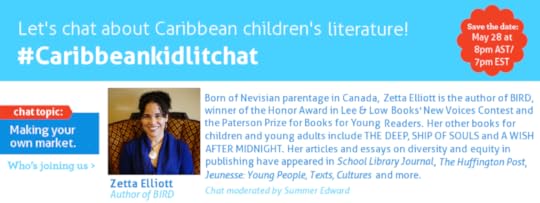 Join me and Summer Edward on Thursday at 8pm for a Twitter chat: MAKING YOUR OWN MARKET.
Join me and Summer Edward on Thursday at 8pm for a Twitter chat: MAKING YOUR OWN MARKET.
Some issues we’ll discuss during this chat are:
-Working beyond the framework and confines of mainstream children’s publishing.
-Moving beyond self-promotion to marketing.
-Self-publishing, cottage industry and community-based publishing.
-Reaching the widest audience possible.
-Addressing the need for more literature that reflects Caribbean children’s and young people’s cultural and lived experiences.
Join us on Twitter and come prepared with your questions!

